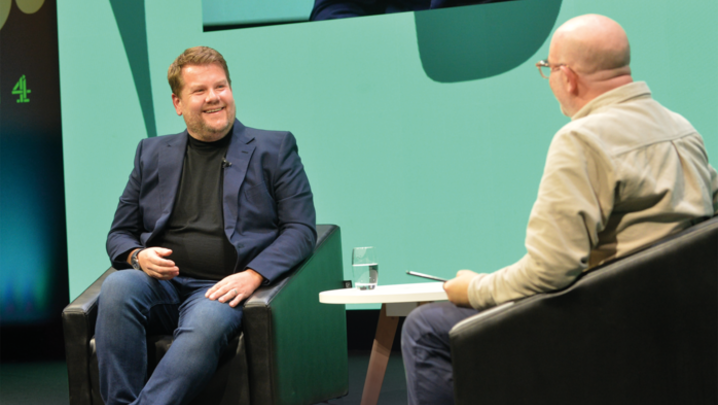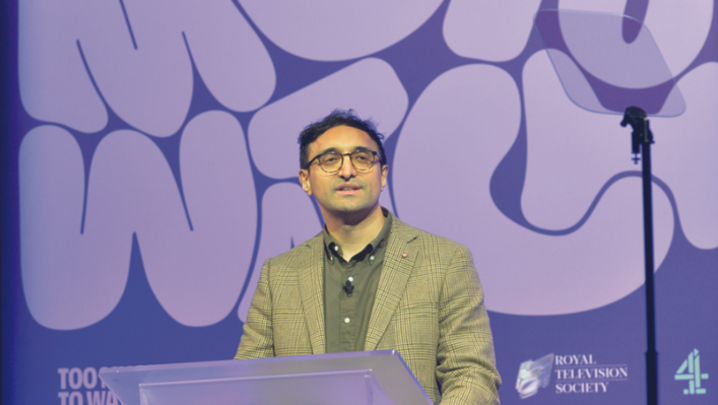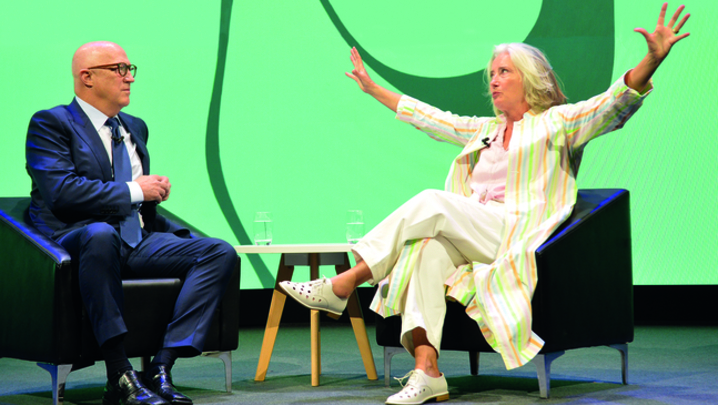Tanya Moodie, the winner of the RTS Breakthrough Award for her role in Motherland, is taking lockdown in her stride, discovers Caroline Frost
Even in this strange world of lockdown, it’s all relative. While many of us can amble to our backyard or at least to the hall cupboard, Tanya Moodie is stuck on a chair when I speak to her via FaceTime at her sunny south London home.
“I’m on lockdown 2.0,” she explains, flipping her screen to show off her leg, in plaster up to the knee. What happened? She grimaces. “It was April Fool’s Day, I got over-excited trying to punk my daughter, and ended up falling down the stairs.”
As I am to discover during our chat, Moodie is a resolutely glass-half-full kind of person, even faced with a dislocation and bad break requiring a metal plate. “It could have been so much worse. My partner was home at the time, so he could drive me to hospital; the orthopaedics department was empty and able to treat me quickly. My daughter is 12, old enough to attend to her own home schooling. There were lots of things in place to make me feel lucky.”
What kind of TV is providing distraction? Like everyone else, Moodie and her partner have been sucked in by Netflix’s Tiger King – “although we had to ration ourselves to two episodes a night as it’s an assault on the senses”. Other delights include quirky, generally American, comedies, often female-led or with an African-American protagonist.
“I’m drawn to things that feel as though they started out small with a gem of an idea and then mushroomed.”
Moodie is filling evenings when she should have been on stage at the Almeida Theatre, north London, in Daddy: A Melodrama, the eagerly awaited UK debut of US playwright Jeremy O Harris. What of its return later in the year? She shrugs. “Everyone wants it to happen, it’s a case of getting the ducks in a row.”
She is sad for two colleagues in particular. “Director Danya Taymor’s talent should be known beyond the borders of the US. And for the writer, Jeremy, this would have been his introduction to the British stage.”
Moodie could be forgiven for feeling a similar frustration for herself after winning this year’s RTS Breakthrough Award for her performance as Meg in BBC Two sitcom Motherland. With such recognition, a whole new host of phone calls, meetings and offers was surely hers for the taking, except…
She has the calm smile of a long-time practising Buddhist. “I’m very philosophical about these things. Over the years, I hope I’ve developed the understanding and wisdom not to attach to outcomes, to what I think should happen next. There’s no clear trajectory.
“Being a Buddhist fundamentally paints the picture of my worldview. It’s my toolkit,” she explains. “So far in my career, there is nothing I can complain about at all. I’ve had a wonderful time, worked with amazing people and always earned enough to survive. I would hate to think that something pops in my head, ‘Now I’m owed this.’ That would be deeply toxic and unhelpful.”
To be sure, she has enjoyed plenty already for which to be thankful. As a child growing up in Ottawa, she credits her mother’s career in medicine for her own pragmatic, hard-working approach and her father’s love of Shakespeare for introducing her to the Bard.
He is now ailing, and she movingly recounts a recent trip home to Canada where “he could barely remember our names but he could still recite Shakespeare. Of course, I was blubbing.”
Moodie was inspired to act by watching other teenagers, including her own brother, Andrew (also an actor), and thinking, “I could do that”. She decided, aged 17, “If I’m going to do this, I want to have a scholarship”, and pursued her acting dream all the way to Rada, arriving with one suitcase in London in 1990 – “IRA bomb threats, tall Georgian buildings, narrow streets and tiny cars, plus tins of steak and kidney pie – what is that? – and sudden tea breaks in the middle of whatever we were doing.”
As a graduate, armed with a two-year visa and an agent, Moodie’s career began, but with no starriness in her sights. Instead, she remembers, “I wanted to be a working actor, an actor’s actor.”
Talent will out. The years since have brought accolades including a critically acclaimed Medea, an Olivier nomination for her role as Esther in Intimate Apparel at north London’s Park Theatre and, particularly satisfyingly, her Gertrude in an all-black casting of Hamlet for the RSC.
Ever-thoughtful, Moodie herself questioned director Simon Godwin on the value of this, and remembers, “It was delightful, so organic. The director told me he just wanted to create an entire world around his star, Paapa Essiedu, it was that simple.”
Before she knew it, Moodie felt at home in the theatre – “it was my home, my back garden, I’d carved my furrow and I knew what I was doing” – and, initially, she felt the opposite in TV-land.
Understandably, she is wary, and perhaps weary, of talking about diversity. “There was a big drive to diversify casting. I’ve seen every phase. You try not to get bitter because it’s a journey,” she says, but she remembers several occasions when it was clear that the role she was reading for was not written for a woman of colour.
“People write for what they know. As an actor, I was thinking, ‘How do I not come across as a square peg in a round hole?’ I didn’t have the self-belief. Plus, if you can see it, you can be it – and, in TV, I never saw the woman I am in a narrative, so part of me never thought I deserved to be there.”
Fortunately, on the set of an episode of Prime Suspect, an angel appeared to Moodie in the form of Helen Mirren. “On the first day, the name of my character wasn’t quite right, and I sat at the read-through feeling out of place. Helen Mirren came over and told me, ‘I don’t think your character’s name is right. Have a think about what she should be called and I’ll talk to the writers.’ I felt so moved, knowing she saw it, too, and she gave me a bridge.”
That meant, by the time the role of Meg in Motherland appeared on the table, Moodie was doubting herself less and punching higher. “It felt such a great fit.”
On her third audition, Moodie decided to root inside her Buddhist toolbox, reminding herself, “I have to let go, and just do the work.” It paid off and gave the actor the chance to explore that “me-ness” that had been missing from many previous roles.
“They asked me, ‘What would Meg look like?’ I said, ‘She’s a professional woman who’s already made it. She’s beyond trying to impress anyone. She’s going to be herself, she’s going to have her Afro out.”’
Thus was Meg born in all her ball-busting, tequila-swilling, alpha-female glory, together with some fresh fan and industry appreciation for the woman who created her.
What’s next? With her business partner Sarah Rutherford, Moodie runs a production company with two projects in development, although she squirms, “I don’t know how much I’m allowed to tell you.” Suffice to say, both have prospective lead roles for Moodie that will surely make the best of her palpable glow.
She says herself, “I’d love to feel the confidence on TV that I feel in theatre. I’m getting there. I stand on set and I realise, ‘I see now how everything fits together and I’m part of it.’”
And even in this most confusing of times, Tanya Moodie once again counts her blessings.







